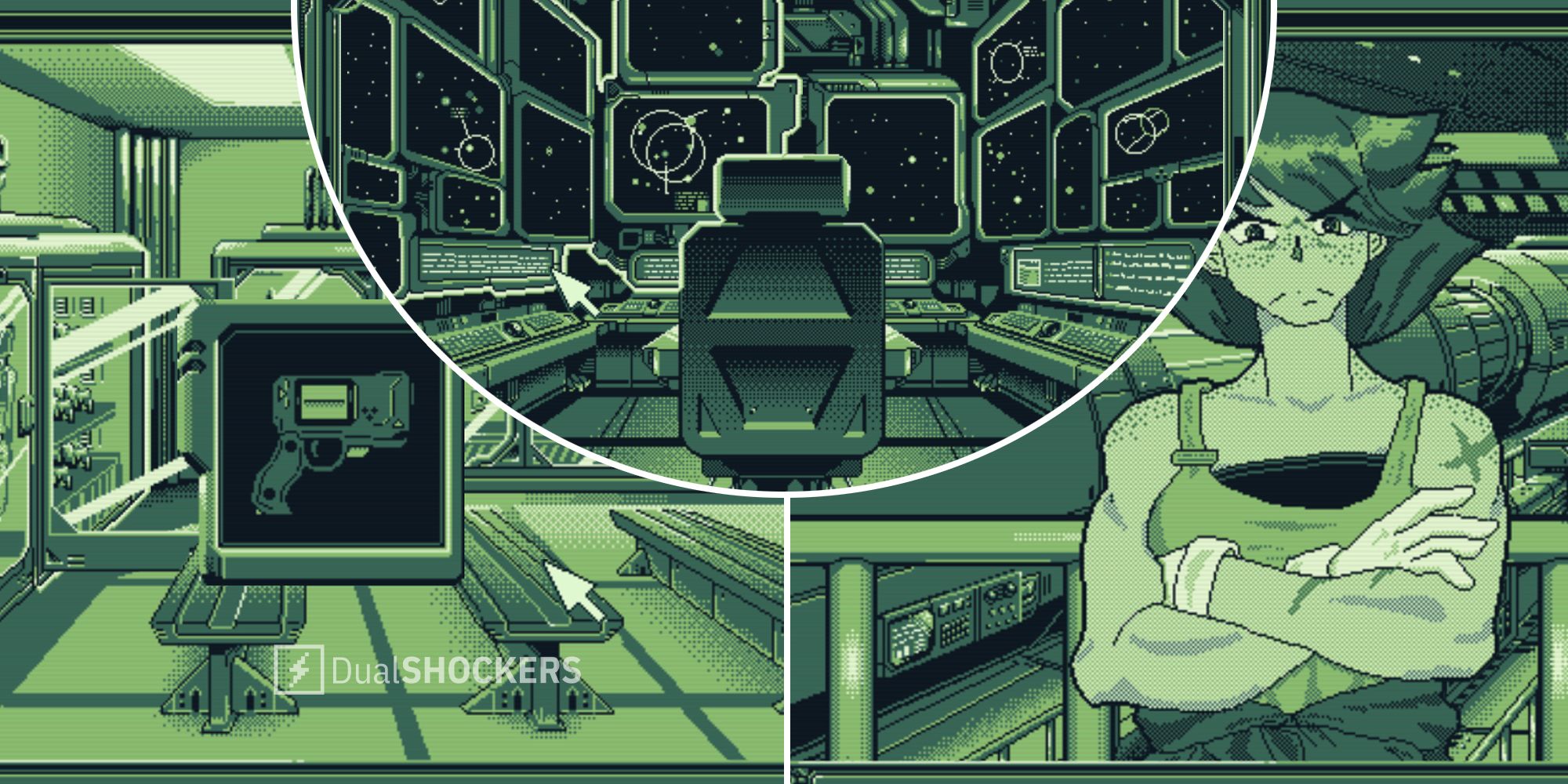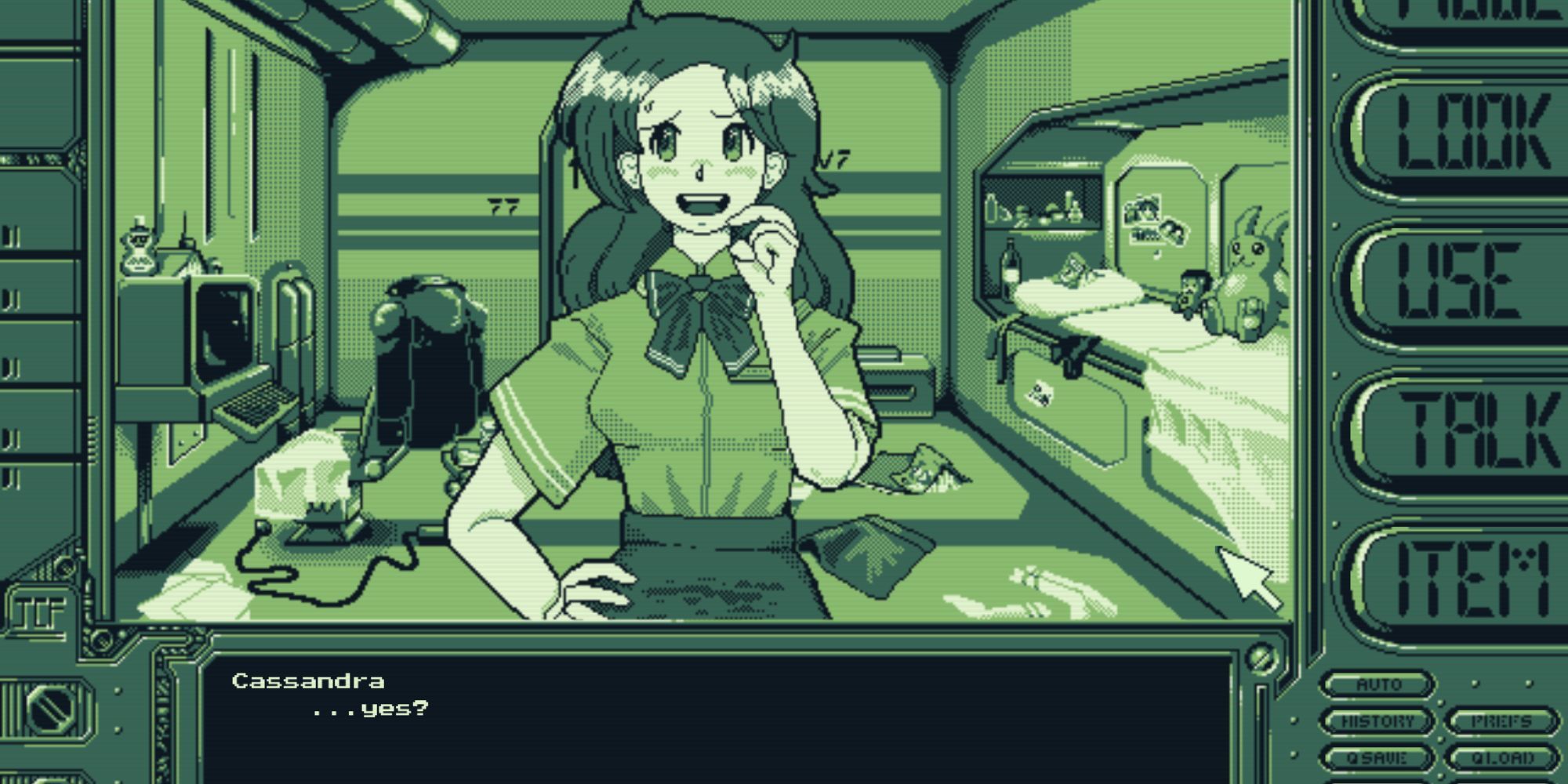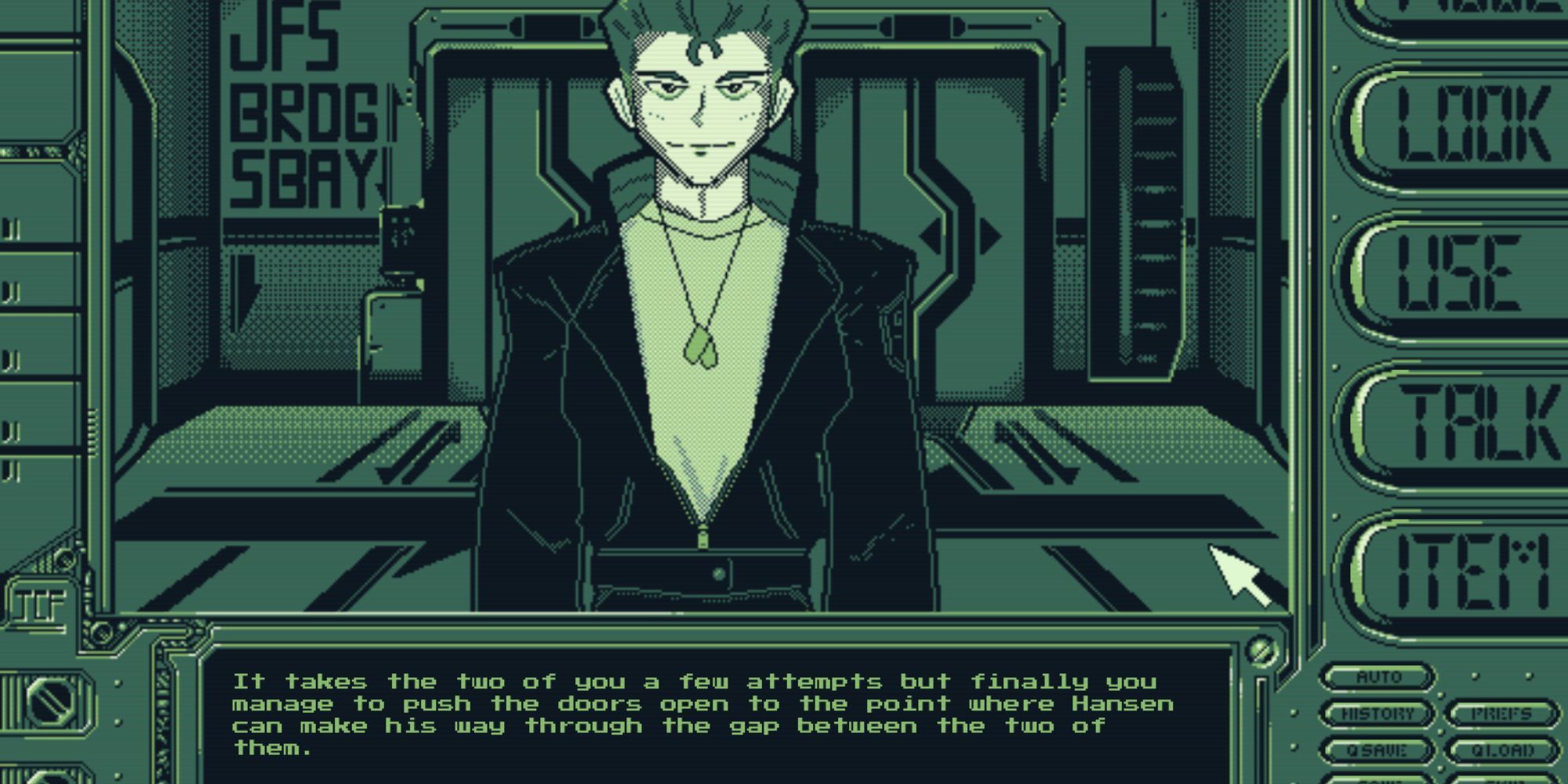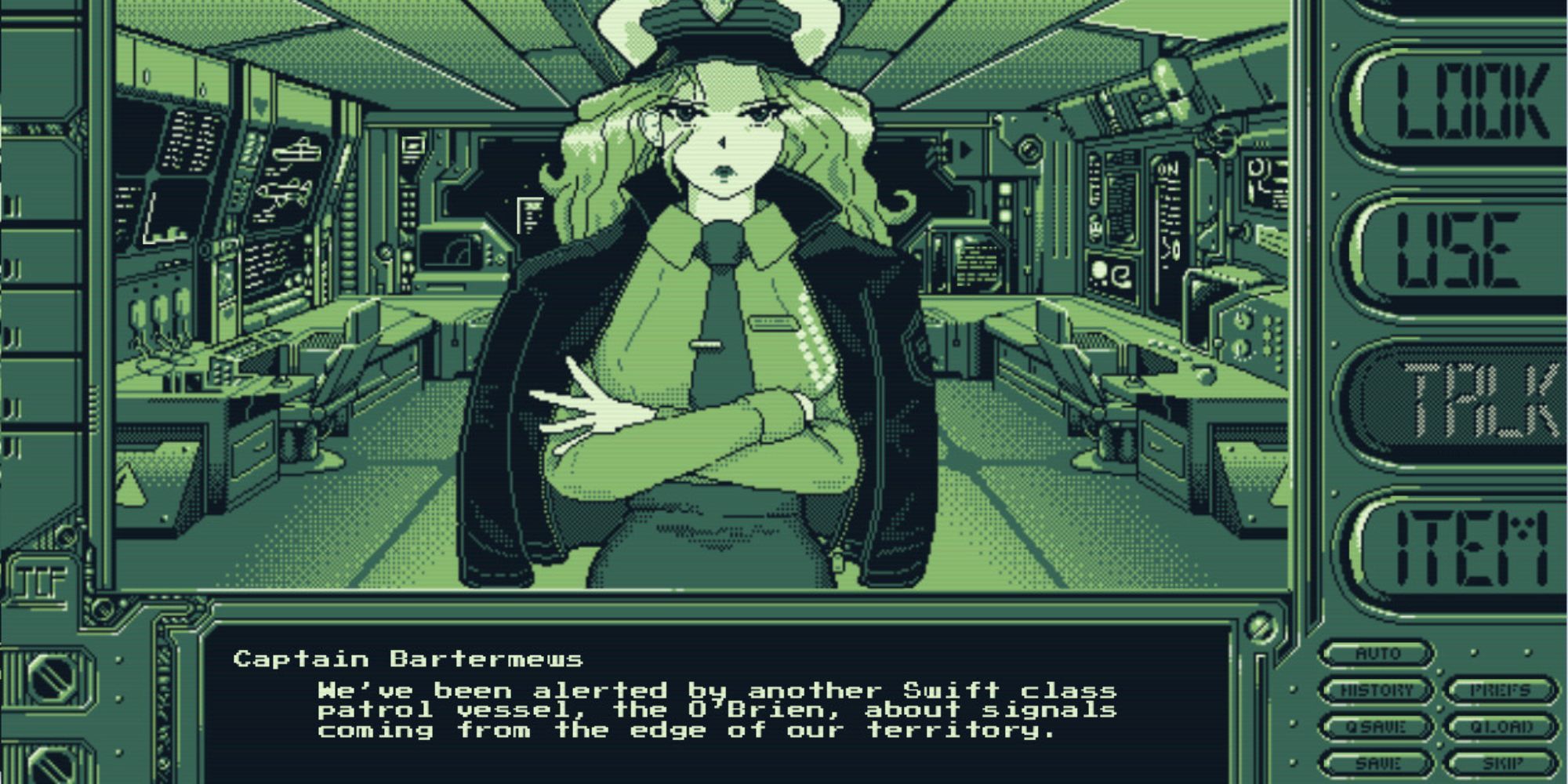I have always been fascinated by the idea of space travel in science fiction–there's nothing quite like the thrill of adventure and discovery in the unknown reaches of the universe. So when I heard that studio Space Colony was sending out invites to embark on a new space adventure titled Stories from Sol: The Gun-Dog, I couldn't resist. Having played the demo on Steam, I feel that the studio understands the magic of not only sci-fi genre but also retro gaming hardware, with the game having a nostalgic emerald green palette reminiscent of early 90s CRT screens.
Keen to discover more, I reached out to its creator Jonathan Durham to talk about how this fascinating visual novel came into existence.
The Gun-Dog, the first game in a planned series, takes you on a treacherous journey aboard the titular space patrol ship to uncover the truth behind mysterious space signals, facing challenges as paranoia and conspiracies arise among the crew in the aftermath of the historical Solar War. The game’s aesthetic is deeply rooted in Japanese mecha/sci-fi anime and movies of the 80s and 90s, as well as the game library of the classic NEC PC-9800, all of which coalesces into a green monochrome presentation. However, the influences also extend beyond the visual realm to permeate every aspect of the core experience.
"I’ve always loved mecha / sci-fi anime and science fiction movies, in particular stuff that came out in the 80s and 90s," Durham tells me. "A lot of the core concepts in Gun-Dog are inspired by shows like Martian Successor Nadesico and Gundam or movies like Aliens and Blade Runner." He's passionate about the sci-fi and cyberpunk works of the early 80s, which flourished during a time when trailblazing developers who possessed ample creative liberty were pushing the boundaries of storytelling and gaming technology.
That era would make way for the 90s, when companies rushed headlong into the low polygon counts of 3D worlds. Visual novels–along with other niche 2D games–were swept under the rug, leaving us to look wistfully back at the remnants of this short-lived era. Now, however, we live in a time when enthusiastic indie developers can roll up their sleeves, and start their own studios to recreate those days.
"Originally it was just me," Durham begins. "When I started Gun-Dog my plan was to do everything by myself, but as the project grew I realized that I was bad at music and backgrounds and that I really didn’t want to do programming, so I reached out to some very talented people online." The studio started from scratch, with the team pulling together around the day-to-day reality of full-time jobs. "Everyone’s done incredible work and I’m really proud to be able to work with them," he concludes.
I want Gun-Dog to feel like it’s the player’s story, rather than simply a story they’re playing
Of course, there are many cases where developers chase that Japanese 80s ideal, but end up indulging in nostalgia and trying too hard to be a perfect copy of their inspirations instead of pursuing their own original story. Durham went to great lengths to ensure that the game’s focus was to create a choice-based narrative that combined his point of view with that of the player. By allowing players to shape the story through their choices, it would feel less like Durham's rose-tinted or forced recollection of the past and more like each person's new individual experience with the time portal he created.
"Mechanically and tonally the game is heavily inspired by Japanese adventure titles like Phoenix Wright, Snatcher, or Time Hollow," Durham explains. "Since I started playing those kinds of games I’ve been fascinated by how well they can draw the player in and use that to emotionally impact them and add weight to their stories. I’ve worked hard on including as much choice as possible within the narrative and to ensure that these choices are actively acknowledged and impactful throughout the game."
This perspective on gameplay seems to be in line with Durham’s take on the mecha genre as a whole. "One of the biggest shifts in my perception as I grew up was realizing that mecha anime wasn’t as much about the mecha and the fights," he says. "It actually was about how they enabled and drove the character drama and plots of the fiction they’re in." It's a similar philosophy to that of the great Yoshiyuki Tomino–Gundam’s creator, who focused in his shows more on characters and their struggles in a war-torn world, rather than the giant robots they were piloting. According to Durham, even the mecha-riding segments of Gundam are designed to involve and impact the player, as well as heavily influence the cast’s backstories and motivations.
There's something captivating about the screenshots from the PC-9800 era, and yet it was a time that most gamers missed out on. But according to Durham, there is one title from that era in particular that inspired The Gun-Dog to do more than just look the part. “The single biggest inspiration from the whole PC-9800’s library would have to be Hideo Kojima’s Policenauts," Durham tells me. "From the style to the mechanics and then to the narrative, Kojima was clearly taking everything he loved from movies, anime, and popular culture and condensing it down into a single title, which is what I’m doing with Gun-Dog."
Gun Dog will be a 5-10-hour experience. The game is currently only two-thirds written, but already has about 75,000 words, by Durham's estimate. This is the passion project of someone who is making the game that he always wanted to exist–not just a copy–and this is reflected in the design choices. "I really want the player to feel that their choices are meaningful, as well as that they are impacted by the choices that they make," he begins. "To do this I’ve been crafting sub-plots for various characters depending on how the player decides to act throughout the game."
Stories from Sol: The Gun-Dog already has a Steam page for players to check out. According to Durham, the team focused on PC first to make the experience as good as possible at launch, but they would love to see it on Switch, PlayStation 5, or Xbox if the opportunity arises. And should it succeed, there'll be plenty more Stories from Sol in the future.
“The single biggest inspiration from the whole PC-9800’s library would have to be Hideo Kojima’s Policenauts."
"Going forward, future Stories from Sol games are intended to focus on different elements of sci-fi and anime that have been a big inspiration to me, like the motorcycle gangs of Akira or Megazone 23 to the pop princess idols you see in Macross, Gundam, and Bubblegum Crisis," Durham says. "They’ll all be tied together with the same core themes so if you’re a fan of Gun-Dog you should be a fan of them too."
Most, if not all, of these shows discuss serious topics in inventive ways, spanning topics like war, politics, technology’s impact on dystopian societies, and the human condition. As a big fan of Macross and Galaxy Express 999 myself, I'm excited by the narrative possibilities teased by Durham and Space Colony Studios. If the studio nails the execution, this could be the retro sci-fi renaissance that many genre veterans like myself have been waiting for years.
Stories from Sol: The Gun-Dog is coming to PC in 2023.




